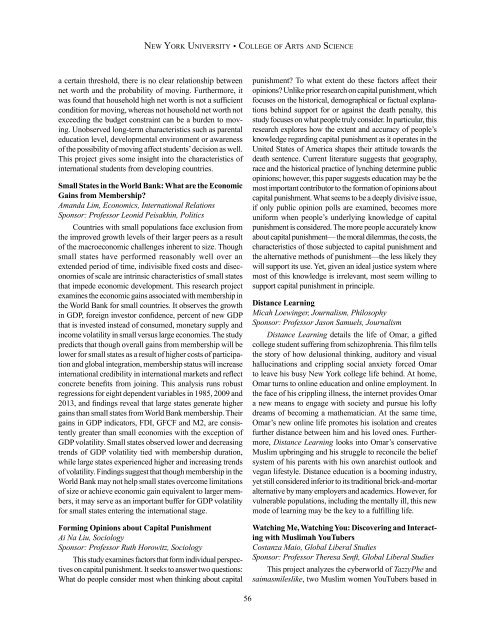INQUIRY
InquiryXIX
InquiryXIX
Create successful ePaper yourself
Turn your PDF publications into a flip-book with our unique Google optimized e-Paper software.
New York University • College of Arts and Science<br />
a certain threshold, there is no clear relationship between<br />
net worth and the probability of moving. Furthermore, it<br />
was found that household high net worth is not a sufficient<br />
condition for moving, whereas not household net worth not<br />
exceeding the budget constraint can be a burden to moving.<br />
Unobserved long-term characteristics such as parental<br />
education level, developmental environment or awareness<br />
of the possibility of moving affect students’ decision as well.<br />
This project gives some insight into the characteristics of<br />
international students from developing countries.<br />
Small States in the World Bank: What are the Economic<br />
Gains from Membership?<br />
Amanda Lim, Economics, International Relations<br />
Sponsor: Professor Leonid Peisakhin, Politics<br />
Countries with small populations face exclusion from<br />
the improved growth levels of their larger peers as a result<br />
of the macroeconomic challenges inherent to size. Though<br />
small states have performed reasonably well over an<br />
extended period of time, indivisible fixed costs and diseconomies<br />
of scale are intrinsic characteristics of small states<br />
that impede economic development. This research project<br />
examines the economic gains associated with membership in<br />
the World Bank for small countries. It observes the growth<br />
in GDP, foreign investor confidence, percent of new GDP<br />
that is invested instead of consumed, monetary supply and<br />
income volatility in small versus large economies. The study<br />
predicts that though overall gains from membership will be<br />
lower for small states as a result of higher costs of participation<br />
and global integration, membership status will increase<br />
international credibility in international markets and reflect<br />
concrete benefits from joining. This analysis runs robust<br />
regressions for eight dependent variables in 1985, 2009 and<br />
2013, and findings reveal that large states generate higher<br />
gains than small states from World Bank membership. Their<br />
gains in GDP indicators, FDI, GFCF and M2, are consistently<br />
greater than small economies with the exception of<br />
GDP volatility. Small states observed lower and decreasing<br />
trends of GDP volatility tied with membership duration,<br />
while large states experienced higher and increasing trends<br />
of volatility. Findings suggest that though membership in the<br />
World Bank may not help small states overcome limitations<br />
of size or achieve economic gain equivalent to larger members,<br />
it may serve as an important buffer for GDP volatility<br />
for small states entering the international stage.<br />
Forming Opinions about Capital Punishment<br />
Ai Na Liu, Sociology<br />
Sponsor: Professor Ruth Horowitz, Sociology<br />
This study examines factors that form individual perspectives<br />
on capital punishment. It seeks to answer two questions:<br />
What do people consider most when thinking about capital<br />
punishment? To what extent do these factors affect their<br />
opinions? Unlike prior research on capital punishment, which<br />
focuses on the historical, demographical or factual explanations<br />
behind support for or against the death penalty, this<br />
study focuses on what people truly consider. In particular, this<br />
research explores how the extent and accuracy of people’s<br />
knowledge regarding capital punishment as it operates in the<br />
United States of America shapes their attitude towards the<br />
death sentence. Current literature suggests that geography,<br />
race and the historical practice of lynching determine public<br />
opinions; however, this paper suggests education may be the<br />
most important contributor to the formation of opinions about<br />
capital punishment. What seems to be a deeply divisive issue,<br />
if only public opinion polls are examined, becomes more<br />
uniform when people’s underlying knowledge of capital<br />
punishment is considered. The more people accurately know<br />
about capital punishment— the moral dilemmas, the costs, the<br />
characteristics of those subjected to capital punishment and<br />
the alternative methods of punishment—the less likely they<br />
will support its use. Yet, given an ideal justice system where<br />
most of this knowledge is irrelevant, most seem willing to<br />
support capital punishment in principle.<br />
Distance Learning<br />
Micah Loewinger, Journalism, Philosophy<br />
Sponsor: Professor Jason Samuels, Journalism<br />
Distance Learning details the life of Omar, a gifted<br />
college student suffering from schizophrenia. This film tells<br />
the story of how delusional thinking, auditory and visual<br />
hallucinations and crippling social anxiety forced Omar<br />
to leave his busy New York college life behind. At home,<br />
Omar turns to online education and online employment. In<br />
the face of his crippling illness, the internet provides Omar<br />
a new means to engage with society and pursue his lofty<br />
dreams of becoming a mathematician. At the same time,<br />
Omar’s new online life promotes his isolation and creates<br />
further distance between him and his loved ones. Furthermore,<br />
Distance Learning looks into Omar’s conservative<br />
Muslim upbringing and his struggle to reconcile the belief<br />
system of his parents with his own anarchist outlook and<br />
vegan lifestyle. Distance education is a booming industry,<br />
yet still considered inferior to its traditional brick-and-mortar<br />
alternative by many employers and academics. However, for<br />
vulnerable populations, including the mentally ill, this new<br />
mode of learning may be the key to a fulfilling life.<br />
Watching Me, Watching You: Discovering and Interacting<br />
with Muslimah YouTubers<br />
Costanza Maio, Global Liberal Studies<br />
Sponsor: Professor Theresa Senft, Global Liberal Studies<br />
This project analyzes the cyberworld of TazzyPhe and<br />
saimasmileslike, two Muslim women YouTubers based in<br />
56


